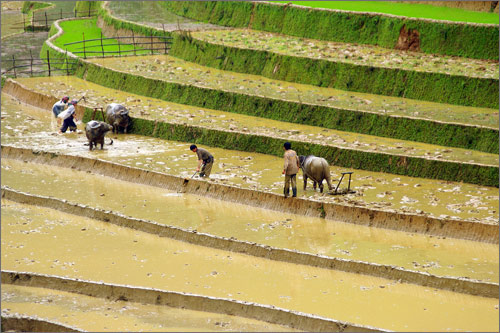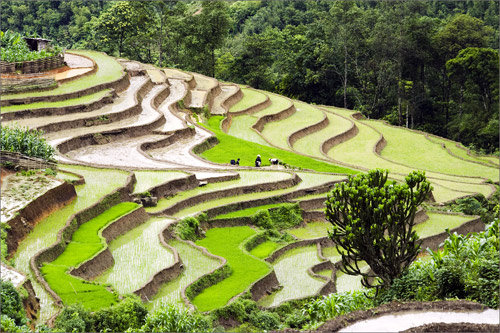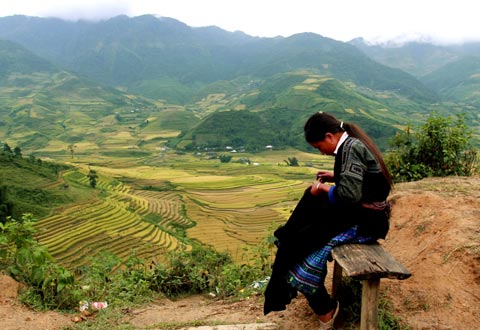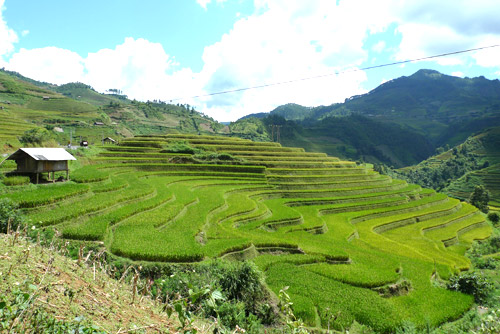I have friends who’ve lived here for much longer than me who cannot speak a word of Vietnamese. Really. If you’ve lived here for more than 5 years and cannot order a Sinh tố dừa, something’s wrong.
 |
| Brian Webb |
Let me back up, in case I seem like a hypocrite. There is a Christian saying that goes something like, “People who live in a glass house should not throw stones.” I live in a glass house. My Vietnamese is terrible.
It is very easy to live in Hanoi or Ho Chi Minh City, only speaking English. Whether you’re an English teacher or a lawyer, it is easy to isolate yourself in an English bubble, saying that Vietnamese is too difficult to learn. I would really like to avoid this.
Anyway, until i can write a column in Vietnamese, by myself, without the help of a translator, I will feel like a small child in Vietnam. No, worse than that. Small children can convey their basic needs, tell when they are happy or unhappy, and why. I cannot do this... yet.
But this desire for language is not about writing, specifically, or even speaking. The real reason is that so many things in this country remain a mystery to me.
These mysteries are small but numerous. For example, why is it okay for Vietnamese men to be so close physically; touching, holding hands, even sitting on each other’s laps and hugging? But, from conversations I’ve had, the issue of homosexuality is taboo.
(I hesitated to write that, because, after my first post, talking about how I would never be married, it might cast some doubt on my own sexuality. So, as an aside, I’ll share one more personal detail. I’ve had a relationship with a girl in America for more than 11 years. This, as all things, must come to an end, in one way or another. But I doubt that it will end in marriage.)
Another mystery, among so many, is religion. I’ve heard many Western people talk about this as well. Ostensibly, this is a Buddhist country. But it seems most people don’t adhere to strict Buddhism. Through foreign eyes, it seems that people go to pagodas when they want to pass an exam, have a baby, or on certain special days.
Maybe this is a misunderstanding on my part. Probably it is! But when I first came here I’d been a vegetarian for 17 years. I thought, since Vietnam is a Buddhist country, it would be easy for me to stick to my non-meat diet. Now I laugh at this, because I’ve started eating meat here out of necessity.
I only bring up these ‘mysteries’ to make a point. The key to unlocking them, and finding a deeper understanding of this culture is to learn the language.
I do have a bit more confidence than before. Last year, I went back to California for 6 months. When I left, I could not even speak to a shopkeeper, outside of numbers: 1,2, 30,000. 40,000, whatever.
When I returned from my trip, something had happened! Sometimes a person would ask me a question in Vietnamese and, to my surprise, a complete sentence would come out of my mouth, without thinking. Not a long or complex sentence. Not at all. But the person would understand me. It was almost as if a little bit of Vietnamese had sunk into my ears, and into my brain without my knowing.
I don’t want to mislead you, my Vietnamese still sucks. But these small steps are tremendously encouraging for a learner. They make me believe, at my best moments, that someday - dare I say it? - I may be able to speak Vietnamese as well as the famous Mr. Joe.
I’m getting ahead of myself.
But this will be the key to unlocking all the mystery, beauty and uniqueness of Vietnamese culture.
Believe me, I will keep you posted on my progress and difficulties in learning your ancient and subtle language. Also, it can go both ways. Many Vietnamese people want to learn English. They will face similar obstacles.
I hope that we could face and surmount these difficulties together, with good humor.













 This level of hardship rather eclipsed our own. Yet there was no denying that our little group was feeling downcast by the lack of visibility in this remote region fabled for its glorious landscapes. Someone had even dared to breathe the word "depressing" as we peered into the monochrome murk. The hotel lobby was heated only by a mean little corner fireplace that had been reluctantly stoked with kindling by the hotel manager in his shiny, too-tight suit.
This level of hardship rather eclipsed our own. Yet there was no denying that our little group was feeling downcast by the lack of visibility in this remote region fabled for its glorious landscapes. Someone had even dared to breathe the word "depressing" as we peered into the monochrome murk. The hotel lobby was heated only by a mean little corner fireplace that had been reluctantly stoked with kindling by the hotel manager in his shiny, too-tight suit. The Black H'mong wear deep indigo tunics with embroidered sleeves and back aprons, dark velvet puttees and pillbox turbans, multi-hooped silver earrings and huge bamboo baskets strapped to their backs. Apart from their lapels embroidered with geometric patterns, the distinguishing characteristic of the Red Dao costume is the astonishing headdress. On top of partially shaved heads, they wear a length of scarlet material wrapped and folded to create a bulging cushion-like turban from which red tassels, tiny bells and silver coins dangle down their backs. Before you get as far as Sapa market, where textiles are displayed on circular cloths rescued from defunct umbrellas in a charmless concrete room, village traders will surround you on the street to display their wares.
The Black H'mong wear deep indigo tunics with embroidered sleeves and back aprons, dark velvet puttees and pillbox turbans, multi-hooped silver earrings and huge bamboo baskets strapped to their backs. Apart from their lapels embroidered with geometric patterns, the distinguishing characteristic of the Red Dao costume is the astonishing headdress. On top of partially shaved heads, they wear a length of scarlet material wrapped and folded to create a bulging cushion-like turban from which red tassels, tiny bells and silver coins dangle down their backs. Before you get as far as Sapa market, where textiles are displayed on circular cloths rescued from defunct umbrellas in a charmless concrete room, village traders will surround you on the street to display their wares. If prosperity does increase in those villages, it will be due to the tireless efforts of the village women. The male population is largely invisible, especially at festival time when many over-indulge in rice wine. The men in evidence were swanning around on their motor scooters. All the tribal girls learn to sew as children and become expert needleworkers. Gaggles of them can be seen in doorways bent over their handiwork or stitching as they walk, mostly objects to sell to tourists – although, as in 18th-century England, they create their finest pieces for their weddings. If it is true that the best seamstresses are able to make the best marriages, then some of these young women must be betrothed to princes.
If prosperity does increase in those villages, it will be due to the tireless efforts of the village women. The male population is largely invisible, especially at festival time when many over-indulge in rice wine. The men in evidence were swanning around on their motor scooters. All the tribal girls learn to sew as children and become expert needleworkers. Gaggles of them can be seen in doorways bent over their handiwork or stitching as they walk, mostly objects to sell to tourists – although, as in 18th-century England, they create their finest pieces for their weddings. If it is true that the best seamstresses are able to make the best marriages, then some of these young women must be betrothed to princes. But the panoramic views justified the effort. Stepped terraces reached dizzying heights and created patterns as beautiful and natural as sand ripples under shallow water. These astonishing constructions result from generations of wet rice farmers working from the top down, in case a terrace collapses and obliterates the one below. In winter the puddled mud on these tiny man-made platforms glints in the light. In summer, the emerald greens and golds of the ripening rice must transform these valleys into a place reminiscent of Tolkien's Shire on a Brobdingnagian scale.
But the panoramic views justified the effort. Stepped terraces reached dizzying heights and created patterns as beautiful and natural as sand ripples under shallow water. These astonishing constructions result from generations of wet rice farmers working from the top down, in case a terrace collapses and obliterates the one below. In winter the puddled mud on these tiny man-made platforms glints in the light. In summer, the emerald greens and golds of the ripening rice must transform these valleys into a place reminiscent of Tolkien's Shire on a Brobdingnagian scale.

















